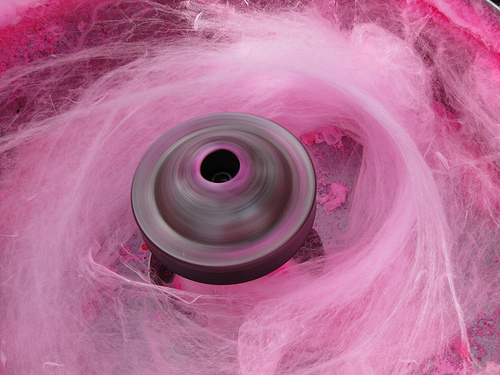A Word on Pink
February 17, 2013 in Design, Fashion, Personal

Hmm…. This has post has been bubbling up inside my mind for a long time, perhaps dating back from a time even before “a post” had its current web related meaning…. And what better time to address the elephant in the room than just after yet another candy cotton filled Valentine’s day …
So Pink… “Who does not love Pink” would be among the most widespread expressions of feelings toward this tint, or tone, of red (with tint being colour + white, and tone being colour + grey, if we consult the Colour Wheel terminology). The last time I heard this rhetorically intended question was during a presentation on upcoming Colour Trends at the Interior Design Show in Toronto in January of this year. The slide on the screen was showing a decidedly pink interior and after pointing the trend-related features, the presenter casualty added, in the most axiomatic manner, “And who does not love pink”. My brain instantly began sending commands to my arm “Raise now”…. I muttered to my myself “I don’t [love pink], not always anyway..”, immediately followed by the internal wondering “But am I the only one?…” I did not raise my arm, and did not see anyone else in the audience express any objections… Did all of these design profession individuals indeed LOVE pink? Were there some other quiet rebels against mainstream Pinkdom that also chose to remain silent to the passive challenge? I will never know for sure, but I can say that in my experience, it has not been that common to meet a female who would have some serious objections against this most girly colour of all. It is not that such non-conformists don’t exist, but the pink loving prevalence is a true reality out there.

In the majority of cases the pink obsession certainly begins from the cradle and more often than not it remains there to stay way past the age when it can be still be regarded as sweet or cute. And sometimes perfectly pink-free sensible ladies who successfully resisted the power of pink for a good portion of their lives give in with no fight when a baby girl enters their life in one way or another, thus closing the pinkless gap and curing the anomaly. Shortly after our son was born and having spent some time around other parents with baby girls, my husband spontaneously exclaimed: “I am so glad we don’t have to deal with all this”, and by “this” he meant the frills, the bows, the unicorns, the princesses, Dora’s shirt, Tinker Bell…. boy, were they ever Pink!.. (Yes, I know, Tinker Bell is SUPPOSED to be green – exactly my point!) I had to agree with our overwhelmed daddy.
Not that I am completely innocent myself. I had a period when my own wardrobe contained quite a few items that sported the contrast between brown and… yes, you guessed it, pink. Admittedly, more brown compared to pink was present in this colour combination, but alas, no, I cannot say even for myself, that I never wore pink. I think even right now one of the drawers of my dresser contains an entirely pink sweater. A pale pink, nothing of the aggressive obnoxious kind, but pink nonetheless… So here you have it, my flushing pink sins confessed, with pun intended. Now I can move on to put Pink in its place.
Much like the brilliant Seinfeld show established once and for all that “Naked” has two states: “Good naked”, and “Bad Naked”, I believe we can split Pink in the same manner. While I am certainly hoping that most people are glad that we as a society generally don’t get to see much of the “Bad naked” – at least not much out in public anyway, the same, sadly, cannot be said about “Bad pink”, both because we see a lot of it, and also because it appears that many people don’t seem to mind having it around. “Good pink”, on the other hand, can really be not so bad, and quite good actually, when done right.
So what constitutes “Bad pink”, and how does it differ from “Good pink”? The answers would be certainly subjective, and I am not one to force an opinion. With colour being an intrinsically visual matter, perhaps it would be best to line up a few visual examples (along with, well, inevitably subjective commentary since I am the author of this post) to illustrate the conundrum, and everyone can be the judge:



R